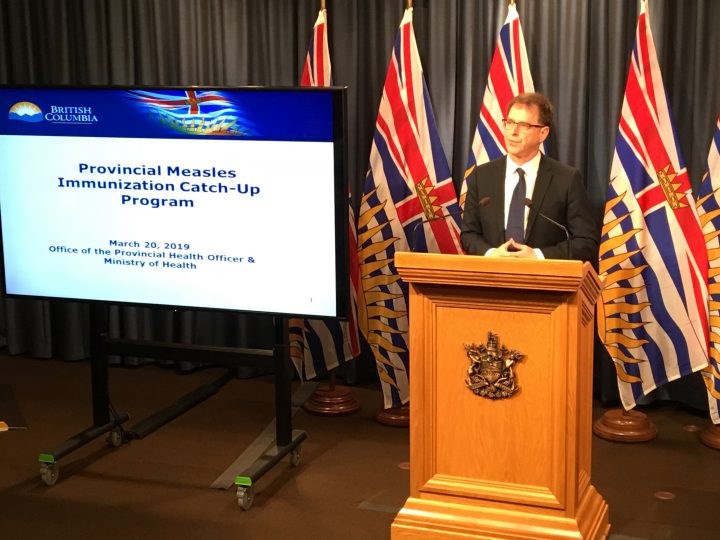Eager to hit the brakes on B.C.’s latest measles outbreak — and to stave off future ones — the provincial government launched an immunization campaign Wednesday.
It’s sending an army of needle-waving nurses into B.C.’s schools to ensure every student has the opportunity to have their measles vaccines brought up to date by the end of June.
Note the language. They’re giving people the choice, not making it mandatory.
That leads to the question: When does government have the right — or the obligation — to tell parents that their, well, tinfoil hattery is endangering the health of other people’s children? At what point does Big Brother become Big Mother?
As it is, B.C.’s immunization rate is slipping. By 2018, just 82 per cent of seven-year-olds had received both doses of the measles vaccine, as recommended. The target is 95 per cent. The lower the rate, the more susceptible we are to outbreaks like the one that began in February. So far, B.C. has seen 19 confirmed cases (none on Vancouver Island), 14 of them traced to a family who had travelled to Vietnam, the rest linked to the Philippines or the U.S. Pacific Northwest.
And yes, measles can be more than just a splotchy, feel-lousy disease. Most sufferers recover, but complications can include pneumonia, deafness, premature labour and miscarriage. One in 1,000 cases leads to encephalitis. One in 3,000 is fatal.
Hence the decision to launch the “catch-up” immunization campaign, which will begin after the kids return from spring break in April and continue through June.
On Vancouver Island, the health authority will hold immunization clinics in schools.
They’ll be open to anyone through Grade 12 but have a focus on students in kindergarten and Grades 1 and 2 who have not yet had both the measles-mumps-rubella vaccine usually given at 12 months and the measles-mumps-rubella-and-varicella shot given between the ages of four and six. Parents of those whose shots aren’t up to date will get a phone call or letter (though it wasn’t made clear how such people will be identified).
Island Health will increase the number of public health clinics and provide after-school clinics, too.
Health Minister Adrian Dix and Education Minister Rob Fleming made it clear there are plenty of reasons kids don’t get vaccines. Families move. They change doctors. Records get lost and parents lose track of what shots Junior got when.
The problem isn’t just one of anti-vaxxers denying mainstream science.
OK, but let’s not pretend the anti-vaxxers don’t exist, not here in contrarian country where questioning The Man is built into our DNA.
t’s a function of B.C. history. The Island in particular has been shaped by people who balk at convention. Wave after wave of the disaffected and the disconnected — turn-of-the-century Finnish socialists seeking Utopia in Sointula, U.S. draft dodgers, 1970s counter-culturists — have washed up on our shores.
From iconoclasts to climate-change deniers, we have a legacy of skepticism that stretches from Amor de Cosmos — the founder of this newspaper and second premier of B.C. — who was so wary of electricity that he refused to ride Victoria streetcars, to the Gulf Islanders whom a Vancouver Sun analysis showed to be 15 times more likely than Vancouverites to reject B.C. Hydro’s smart meters.
Governments in general are, rightly, reluctant to impose their will on parents.
There is a line, though.
In October, an Alberta couple who didn’t take their ailing 14-month-old son to a doctor until the day he died were convicted of failing to provide the necessaries of life.
Another Alberta couple faces retrial in June on similar charges after their 18-month-old son died of meningitis; the court was told they eschewed traditional medical treatment in favour of treating him with homemade remedies including garlic, horseradish and onion.
With measles, the argument is that it’s not just unvaccinated children who are at risk, but the already compromised kids they infect with the highly contagious virus.
“There are children in British Columbia who can’t be immunized for medical reasons, and [their parents] depend on the rest of the community to ensure that their children are safe,” Dix said.
B.C. won’t force parents to have their children vaccinated, but it will follow through with the previously announced mandatory reporting of vaccination status. That will start in September at the beginning of the school year. Details will come in May.
Making parents divulge their kids’ vaccination records still stops short of what is required in some other jurisdictions. (Note that there is much chortling this week over the fate — he was hospitalized with chicken pox — of a far-right politician who opposed a law requiring Italian children to be inoculated against 10 diseases, including measles, before they are allowed to go to school.)
In B.C., said Dix, it’s all about making sure parents have the “opportunity” to catch up.



